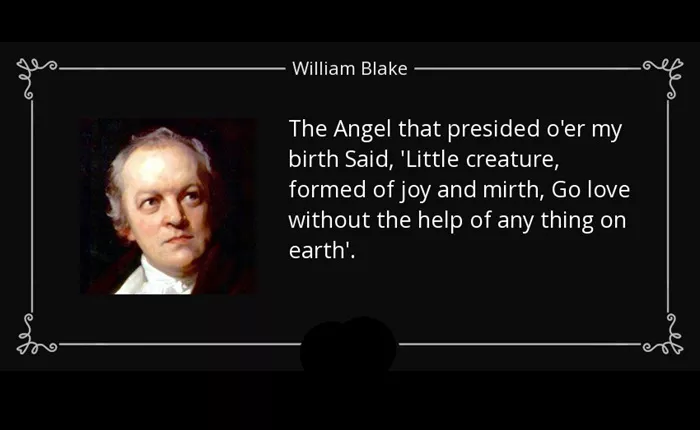Welcome to Poem of the Day – The Angel that Presided O’er My Birth by William Blake.
William Blake’s poem “The Angel that Presided O’er My Birth” offers a brief yet profound meditation on the nature of love, innocence, and divine guidance. With its vivid imagery and philosophical underpinnings, the poem touches on Blake’s belief in the spiritual realm’s direct influence on human experience. This essay will analyze the central themes of the poem, the symbolic meaning behind the angelic figure, and Blake’s views on love, offering a closer look at how the poem reflects his broader philosophical and spiritual concerns.
The Angel that Presided O’er My Birth
The Angel that presided o’er my birth
Said, “Little creature, form’d of Joy and Mirth,
“Go love without the help of any Thing on Earth.”
The Angel that Presided O’er My Birth Explanation
The Role of the Angel: A Divine Guide at Birth
The poem begins with the striking image of an angel, “The Angel that presided o’er my birth,” a figure that is immediately associated with spiritual guidance and protection. The use of the word “presided” suggests a role of authority, indicating that the angel is not merely a passive observer but an active force in shaping the speaker’s destiny. This is typical of Blake’s vision of a universe in which the divine, represented by angels and other spiritual entities, intervenes in human affairs.
The presence of the angel at the moment of birth is also significant, as birth is often seen as the beginning of a soul’s journey through life. By invoking the angel at this pivotal moment, Blake reinforces his belief in a higher, preordained purpose guiding the soul from the very beginning. The angel serves as both protector and guide, setting the tone for the speaker’s existence and the path they are meant to follow. This divine figure does not simply oversee the birth but actively imparts wisdom to the newborn, suggesting that every life is imbued with meaning from the outset.
Joy and Mirth: The Nature of the “Little Creature”
Blake describes the speaker as a “Little creature, form’d of Joy and Mirth,” immediately imbuing the infant with qualities of happiness and lightness. The choice of the words “joy” and “mirth” conveys a sense of purity and innocence, characteristics that Blake often associated with the divine and the untainted state of childhood. In this context, the speaker is depicted as an entity of divine lightness, free from the weight of earthly concerns or struggles. The focus on joy and mirth underscores Blake’s belief in the innate goodness and potential of every individual at birth, free from the corruption of experience or societal expectations.
This characterization of the speaker as a creature of joy aligns with Blake’s larger artistic and philosophical views, where innocence and creativity are celebrated as fundamental aspects of the human soul. The child, untouched by the negative aspects of society, is seen as embodying the purest form of being, capable of experiencing and expressing love without the burdens that come later in life.
Love Without the Help of Anything on Earth: A Divine Love
The final line of the poem, “Go love without the help of any Thing on Earth,” is perhaps the most striking. Here, the angel instructs the speaker to love in a way that transcends the material world. This line suggests that true love is not dependent on earthly possessions or circumstances but is a pure, spiritual force that arises from within. For Blake, love is not merely a human emotion tied to external conditions, but rather a divine and eternal quality that exists independently of the physical world.
Blake’s idea of love here is closely connected to his broader spiritual beliefs. In his works, love is often portrayed as a divine force that connects all living beings to the divine source. By urging the speaker to “love without the help of any Thing on Earth,” the angel encourages an untainted, selfless form of love that does not require material rewards or external validation. It is love in its purest form, unfettered by the limitations of the material world, capable of transcending all earthly concerns.
This concept of love aligns with Blake’s Romantic ideals, where love is viewed not as a transactional or conditional force but as an intrinsic, transcendent power. In this sense, the poem is a celebration of the potential for human beings to connect with the divine through the act of loving, suggesting that true love is a reflection of the divine order itself.
Conclusion: A Vision of Divine Innocence and Love
“The Angel that Presided O’er My Birth” is a brief yet deeply philosophical poem that encapsulates many of the central themes of William Blake’s work. Through the image of the angel, Blake invokes the idea of divine guidance and protection from the moment of birth, suggesting that every life is imbued with meaning and purpose from the outset. The speaker, depicted as a creature of joy and mirth, embodies the innocence and purity that Blake valued as the foundation of human existence.
The final command to “love without the help of any Thing on Earth” presents a vision of love that transcends the material world, embodying the divine force that Blake believed could unite all souls. Through this poem, Blake offers a vision of love and innocence that is untainted by earthly concerns, a love that is both eternal and spiritual, grounded in a higher, divine purpose. In this way, Blake elevates the act of loving to a transcendent spiritual practice, one that reflects the inherent goodness and divine potential of the human soul.

